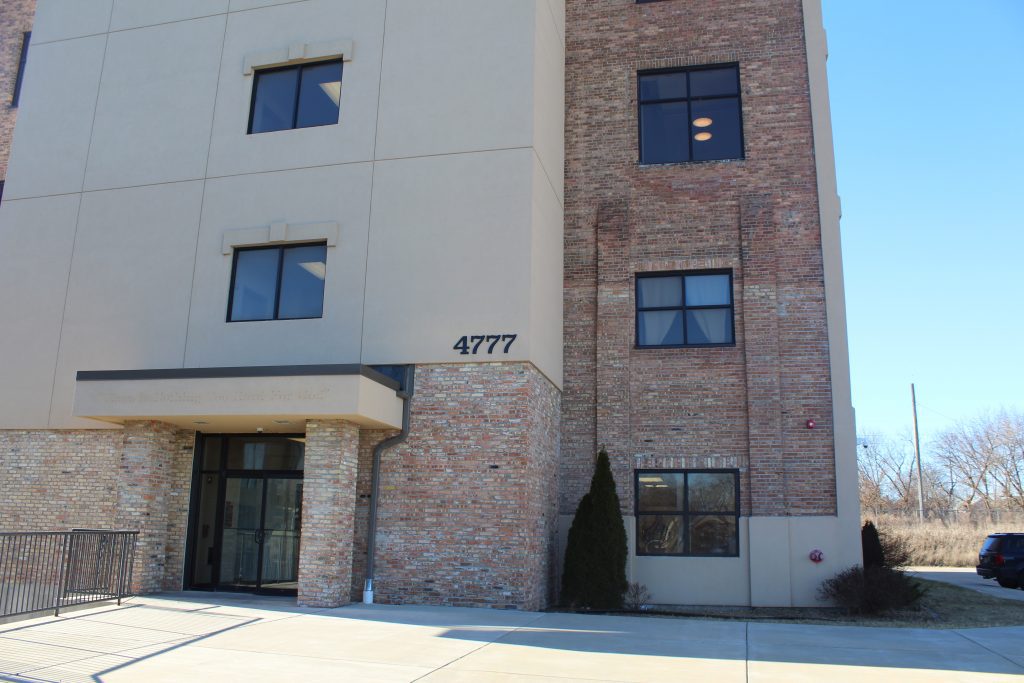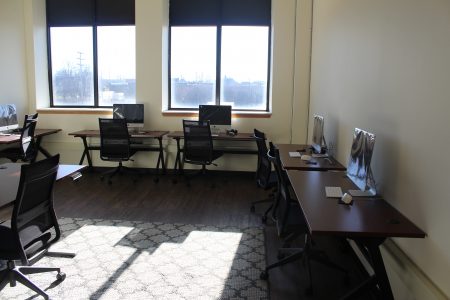New Residential Treatment Facility Opens
Youth who might have gone to Lincoln Hills now at county’s Bakari Center, with aim to reduce recidivism.

The building at 32nd and Hampton was renovated to create a “homelike feel” for youth who will be placed at Bakari Center for treatment. Photo by Allison Dikanovic/NNS.
Bakari is the Swahili word for “promising.” Those who have been working for more than a year to bring the Bakari Center to life hope the name proves to be appropriate for the new Milwaukee County residential treatment facility for youth.
Bakari Center, located at 4777 N. 32nd St., received state licensing on Friday and will be the first facility in Wisconsin to use an evidence-based model of care known as the “integrated treatment model” to reduce youth recidivism. The model uses a kind of therapy for youth and their families to develop a vision of what “a life worth living” would look like.
Mark Mertens, administrator at the Milwaukee County Division of Youth and Family Services, described Bakari Center as “a step down from a corrections facility.”
“The fact is that there are a lot of youth in our community who still need some sort of residential program, proper care and supervision while they’re getting their treatment needs met, but don’t need to be in a secure setting,” he said.
“Hopefully, we can reach some kids earlier and provide them the treatment that they need, to prevent them going to corrections down the road,” he said.
According to the Milwaukee County Department of Health and Human Services, more than 80 percent of youth in the justice system have experienced trauma in their lives. In 2016, 76 percent of youth at Lincoln Hills were receiving mental health services, reported the Wisconsin Office of Children’s Mental Health.
Mertens said there is a shortage of non-secure, residential options for youth to provide needed treatment, and that the courts are placing youth out of Milwaukee County, and at times, out of Wisconsin.
“We started to see kids getting placed out of state,” said Mertens. “We didn’t want that, so we wanted to create our own resource. This will hopefully fill that void.”
“We are short on these kinds of options,” agreed Joe Donald, the presiding judge of Milwaukee County Children’s Court.
Milwaukee County contracted with Wisconsin Community Services to operate Bakari Center. Up to 24 boys, ages 13-17, can stay there at a time, but the facility will start with just six. According to Mertens, the average stay of a youth at Bakari Center will be four to six months, but treatment will continue for four months after he leaves.
Mertens said the center is part of a broader initiative by Milwaukee County to transform the youth justice system from one that focuses on punishment to one that focuses on treatment and re-engagement.
A homelike feel

Instructors from the Norris School District, as well as Bakari Center staff, will assist youth with their homework in small groups in each floor’s learning lab. Photo by Allison Dikanovic/NNS.
The bean bag chairs in the common area, pingpong table in the cafeteria and large windows in every room give Bakari Center the feeling of a newly renovated college dorm building.
“We wanted to create a homelike feel,” said Chad Meinholdt, the administrator of specialized services at Wisconsin Community Services and a lead on the project.
The first floor also has a conference room for family visits.
Each youth will have his own bedroom with at least one large window, which he can decorate himself, and a full bathroom.
Each floor has a “teen room” to hang out in, as well as a “learning lab” stocked with Apple computers, where the boys will do schoolwork. Norris School District, based in Mukwonago, will provide the educational services through individualized, online curricula that are intended to help the boys catch up if they are behind in school, Meinholdt said.
Milwaukee County consulted with Henry Schmidt, an assistant clinical professor of psychology at the University of Washington, to train staff in the integrated treatment model he developed specifically for youth in residential treatment.
Schmidt said the program is trauma-informed, strengths-based and emphasizes a successful transition home.
“If we took a broad perspective, we would see criminal behavior as one aspect of a larger life,” Schmidt said. “The behaviors that are happening in that realm are people trying to solve problems in one way… We want to give [the youth] skills to solve problems in a better way.”
Meinholdt said all staff in the building are trained in the methods of Dialectical Behavioral Therapy (DBT), which works on building skills to more effectively manage emotions, form relationships and deal with stressful situations. He said DBT uses a specific language to describe skills and tools, so youth, staff, therapists and families will all be on the same page.
Mertens said the county chose this model because the consistency gives youth many opportunities to keep practicing new skills.
“Everyone in the program is reinforcing and providing the therapy all day long,” he said.
Bakari Center’s location in the city, near neighborhoods where many of the youth come from, is intentional and part of the treatment model.
“We want the youth to be able to navigate the situations and circumstances that occur in their community that have derailed them in the past,” Schmidt said.
Mertens said that part of the treatment at Bakari Center would include connecting youth to supports in the city that they can continue to access once they move out. Meinholdt said that the center already has a partnership with the YMCA for youth to have regular access to recreation.
“These are our kids,” added Donald. “We need to be able to equip them with the skills to navigate and live in Milwaukee, because that’s where they’re from.’
Family members will be involved in their youth’s progress at Bakari Center and will receive therapy themselves. Meinholdt said this will help parents reinforce the skills the boys learned while at Bakari Center when they get home. The family will continue to work with the same therapist for at least four months after the youth returns homes.
Rochelle Landingham, director of Family Strong, LLC, advocates for families who have children in Wraparound, a county service provider. She said involving the family in treatment makes sense because “a lot of time the trauma or issues that a young person is going through is directly related to their family situation.”
“The kids are going to go home at some point,” Donald said. “It makes it more difficult to ensure a long- term positive outcome if we don’t address the environment they’re returning to.”
These long-term positive outcomes have been shown to improve for youth who have participated in an integrated treatment model in other places. According to the Washington State Institute for Public Policy, the program significantly reduced recidivism rates for youth.
More reform
After state lawmakers voted in March to close Lincoln Hills and Copper Lake by 2021, the state and county began developing new approaches to youth justice. Bakari Center is an initial piece of that, but Mertens said the county is working to reform its youth justice system as a whole, through a coordinated initiative called Project Rise.
The county is preparing to propose building a new secure residential facility for youth as well, one of several correctional facilities that will be located around the state. According to Mertens, Milwaukee County will be monitoring the success of Bakari Center as “a pilot of sorts” to see if it wants to implement the same model in the future secure center.
Mertens said that the county’s goals are to reduce the number of youth in corrections and to provide more community-based alternatives. He said that though Bakari Center is located in the community, it isn’t an example of “true diversion,” which would keep a young person out of the system altogether.
Sharlen Moore, co-founder of the advocacy organization Youth Justice Milwaukee, said that Bakari Center is part of a “continuum of care” that will help get youth re-connected with their families and communities. As the county moves forward with more reform plans, she said she hopes that community members will have a say in the decisions being made.
“We have to keep making sure that young people and families are consulted and supported around the work that needs to be done to restore and build community trust around youth justice,” Moore said.
This story was originally published by Milwaukee Neighborhood News Service, where you can find other stories reporting on eighteen city neighborhoods in Milwaukee.
More about the Lincoln Hills and Copper Lake Facilities
- Lincoln Hills and Copper Lake Youth Facilities Found in Compliance, Triggering End to Court-Ordered Monitoring Set in Place by 2017 Lawsuit - American Civil Liberties Union of Wisconsin - Jan 28th, 2026
- Gov. Evers, Doc Celebrate Completion Of Successful Reforms at Lincoln Hills and Copper Lake Schools - Gov. Tony Evers - Jan 28th, 2026
- Gov. Evers Announces State Building Commission Approves Approximately $185 Million in Projects Across Wisconsin - Gov. Tony Evers - Dec 17th, 2025
- Building Commission OKs Planning Funds to Reorganize Wisconsin Prisons - Sarah Lehr - Oct 29th, 2025
- State Building Commission Releases Funding Gov. Evers Requested to Revamp Corrections Facilities - Gov. Tony Evers - Oct 28th, 2025
- Gov. Evers Announces Evers Administration to Move Forward with Comprehensive Plans to Revamp Corrections Facilities - Gov. Tony Evers - Oct 14th, 2025
- For The First Time, Wisconsin’s Youth Prisons Are Fully Compliant With Required Reforms - Rich Kremer - Oct 3rd, 2025
- Inmate Sentenced For Role in Youth Counselor’s Death at Troubled Prison - Isiah Holmes - Aug 11th, 2025
- Evers’ Prison Plan Receives Mixed Reviews - WPR Staff - Feb 21st, 2025
- ‘First of its Kind in Wisconsin’ Collaboration Will Support Disabled Incarcerated Youth - Andrew Kennard - Dec 12th, 2024
Read more about Lincoln Hills and Copper Lake Facilities here

















